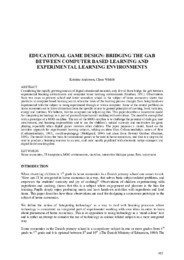| dc.contributor.author | Andersen, Kristine | en |
| dc.contributor.author | Witfelt, Claus | en |
| dc.coverage.spatial | CY - Λευκωσία | en |
| dc.creator | Andersen, Kristine | en |
| dc.creator | Witfelt, Claus | en |
| dc.date.accessioned | 2016-02-17T06:08:58Z | |
| dc.date.available | 2016-02-17T06:08:58Z | |
| dc.date.issued | 2003 | |
| dc.identifier.uri | http://hdl.handle.net/10797/14702 | en |
| dc.description | Περιέχει το πλήρες κείμενο | el |
| dc.description.abstract | Considering the rapidly growing amount of digital educational materials only few of them bridge the gab between experimental learning environments and computer based learning environments (Gardner, 1991). Observations from two cases in primary school and lower secondary school in the subject of home economics shows that problems in computer based learning occurs when the basis of the learning process changes from being hands-on experimental with the subject to being experienced through or with a computer. Some of the central problems in home economics are to force abstraction from the specific course to general principles of cooking, food, variation, energy and nutrition. We believe, that the computer can help doing this. This paper describes a innovative model for integrating technology as a part of practical experimental working with own ideas. The model is exemplified with a prototype of a MOO storyline. The aim of the MOO storyline is to challenge the potential of dialogue, user
involvement, and learning responsibility and to use the children’s natural curiosity and motivation for game playing, especially when digital games involves other children. The paper proposes a model, based on the narrative approach for experimental learning subjects, relying on ideas from Csikszentmihalyis notion of flow (Csikszentmihalyi, 1991), storyline-pedagogy (Meldgaard, 1994) and ideas from Howard Gardner (Gardner, 1991). The model forms the basis for educational games to be used in home economics, and thus is a step on the road to produce a learning resource in an area, until now mostly populated with electronic recipe-managers and digital health-tracking ditto. | en |
| dc.language.iso | eng | en |
| dc.publisher | Department of Educational Sciences, University of Cyprus | en |
| dc.relation.ispartof | Computer based learning | en |
| dc.rights | info:eu-repo/semantics/openAccess | en |
| dc.rights | Open Access | en |
| dc.source | CBLIS Conference Proceedings 2003 Volume I: New Technologies and their applications in education | en |
| dc.title | Educational game design: bridging the gab between computer based learning and experimental learning environments | en |
| dc.type | info:eu-repo/semantics/conferenceObject | en |
| dc.subject.uncontrolledterm | Home economics | en |
| dc.subject.uncontrolledterm | IT-integration | en |
| dc.subject.uncontrolledterm | MOO-environments | en |
| dc.subject.uncontrolledterm | Storyline | en |
| dc.subject.uncontrolledterm | Interactive dialogue game | en |
| dc.subject.uncontrolledterm | Flow | en |
| dc.subject.uncontrolledterm | Enjoyment | en |
| dc.contributor.conferenceorganizer | Learning in Physics Group, University of Cyprus | en |
| dc.contributor.coordinator | Constantinou, Constantinos P. | en |
